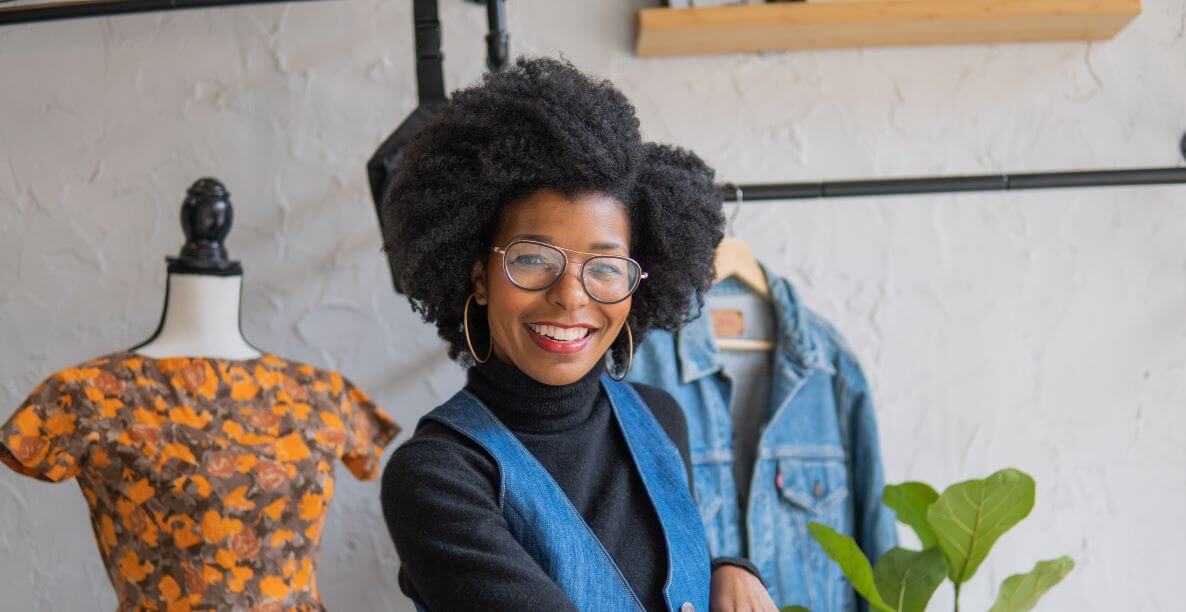For Dr. Kimberly McGlonn, fashion can’t be separated from activism.
Activists, she says, have always used style to communicate their missions — whether it was the Black Panthers donning dashikis and traditional African designs or Civil Rights and Black cultural leaders embracing preppy aesthetics.
“There was a thinking that what you wore was one way of essentially demanding dignity,” McGlonn says.
Read about Grant Blvd:
Her first business, Grant Blvd, is part of that legacy. McGlonn the sustainable clothing brand and shop on the idea that our clothes reflect our values. Grant Blvd is an eco-conscious B Corp and a Fair Chance employer, which means she works with re-entry organizations to hire people who have been incarcerated. She also donates a portion of the business’s proceeds to social justice-minded organizations, including West Philly-based nonprofit Books Through Bars.
“It’s a curation that’s really linked to a social political movement that’s always been at the heart of my own activism,” McGlonn says.
This year, McGlonn is turning her attention to vintage fashion and its ties to social justice activism between 1954 and 1972. On February 3, 2023, she’ll open her second shop, Blk Ivy, in Grant Blvd’s current West Philly home at 3605 Lancaster Avenue. (Grant Blvd will relocate to a larger space at 140 S. 34th Street, closer to Penn.)
With a focus exclusively on vintage clothes from the Civil Rights era, Blk Ivy offers a triple-shot of environmentalism, activism, and fashion.
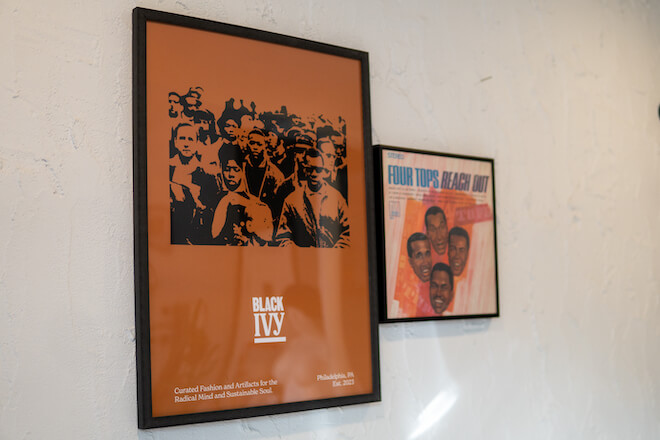
Conscious — not fast — fashion
McGlonn has always loved thrifting. Growing up in Milwaukee, she would get excited over the vintage fabrics and pieces she’d find in thrift shops. She also appreciated the longevity of older clothes — she’s had one orange and brown patterned dress that hails from the 1950s or 60s for 17 years — along with their smaller environmental footprint.
Every second 2,150 pieces of clothing are thrown away in the U.S., Bloomberg recently reported. What’s more, fashion — especially fast fashion — is one of the world’s highest polluting industries. Textile manufacturing accounts for 10 percent of global carbon dioxide output and 20 percent of global wastewater. The industry consumes more energy than the aviation and shipping sectors combined.
That’s why Grant Blvd’s designs, makes and sells clothes made entirely from dead stock fabrics or repurposed thrift items. They transform textiles that may have ended up in a landfill to use by using them to create innovative, leisurewear-inspired designs. McGlonn launched her line and the shop in 2017 with secondhand t-shirts screen-printed with the phrases “Earth Bae,” “Really Philly,” and “End Mass Incarceration.”
McGlonn also long loved activism. Growing up, she watched her mother volunteer at a local correctional facility. Her father grew his own food and shared it with their neighbors who were living in food deserts in Milwaukee’s predominantly Black North Side. Grant Blvd takes its name from the street where she lived growing up.
Here in the Greater Phila area, McGlonn volunteered with Books Through Bars, served as a Jenkintown borough councilmember and worked as high school English teacher, focusing on texts that grappled with colonialism and marginalization.
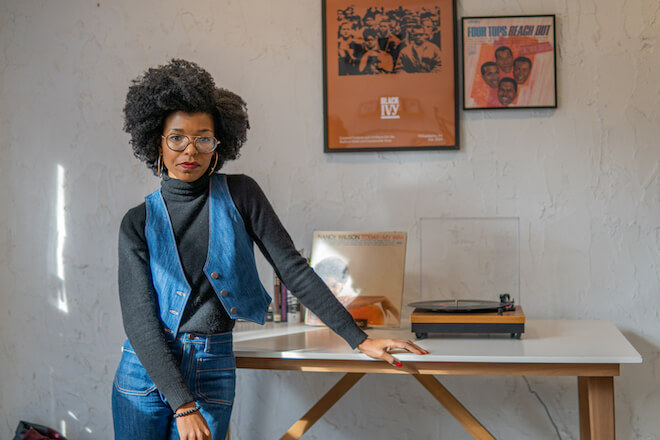
A Civil Rights fashion statement
McGlonn wanted Grant Blvd’s t-shirts to attract customers who were not afraid to take a stand for what they believe in. It worked. And then some.
The business has grown beyond expectations, releasing multiple original collections made from 100 percent reclaimed textiles. Grant Blvd has also garnered attention from big names. Last year, Beyoncé gave them $10,000 grant through her foundation BeyGood as part of her commitment to supporting Black-owned businesses.
But while Grant Blvd often breathes new life into secondhand items and remnant fabrics, it’s not a vintage shop. Blk Ivy draws on McGlonn’s passion for curating clothes from specific moments in history. The store’s collection focuses on clothes from the Civil Rights movement, beginning in 1954, the year Brown v. Board of Education was decided, and ending in 1972, when Shirley Chisholm became the first woman — and first Black woman — to run for president.
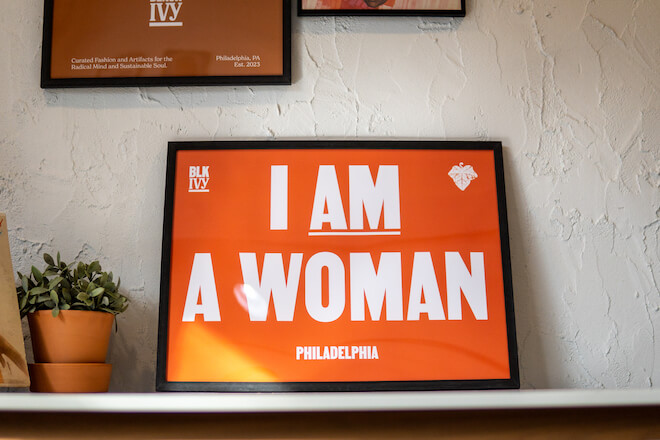
“It’s a curation that’s really linked to a social-political movement that’s always been at the heart of my own activism,” McGlonn says.
Besides being a name that feels like it was plucked right from the mind of Beyoncé, parent of Blue Ivy, Blk Ivy has historic ties to the period McGlonn wants to explore. The name and the idea for the new shop came from I Called Him Morgan, a documentary film on Philadelphia-born jazz musician Lee Morgan.
A brief section of the film explored Morgan’s fashion choices and the connection to the Black Ivy fashion movement, in which Black cultural leaders from Amiri Baraka and Malcolm X to James Baldwin and Sidney Poitier adopted and subverted the preppy style common on Ivy League campuses. Oxford button-downs, sleek black turtlenecks, and hand-stitched loafers were all part of the trend.
McGlonn traveled across the country, hunting through thrift shops in places as close to home as Bucks County and as far away as Chicago and Arkansas. Hand-embroidered cardigans with silk linings, heavy wool sweaters in many shades of blue, tailored dresses, and men’s button-downs are just some of the pieces she’ll have on display when the store opens its doors.
She envisions the new store as part clothing retailer, part accessible museum. It’ll feature posters from or inspired by the era, classic records, and early editions of James Baldwin’s works and Malcolm X’s autobiography. Vintage dresses from McGlonn’s personal holdings — including the orange and brown patterned beauty — will be on display. Used books and records will be up for sale.
“Blk Ivy is going to give a 1960s postmodern Reading Room vibe,” she says. Book clubs centered on Black writers and voter registration events in the space are already in the works for the store’s event programming. A portion of the proceeds from the store will go to the New Pennsylvania Project, a nonprofit dedicated to expanding the state’s electorate.
“I know that if I see [Grant Blvd] in a room that that’s also a person that shares my values: They care about people. They care about the planet. They care about shopping small. They care about supporting Black-owned businesses. They care about living wages.”
Fashioning — and wearing — her values
Blk Ivy’s launch isn’t all that’s happening with McGlonn this year. Grant Bvld’s new flagship location will open later in February. Its launch will coincide with the brand’s expansion into menswear. Currently, McGlonn estimates only about 10 to 15 percent of the brand’s offerings have catered to men or masculine-presenting people. When the shop reopens, that number will be closer to 30 percent.
“We have a lot of people who want to support us who identify as men or who prefer the fashion that’s deemed for men. And we definitely want to be ready to offer something for those folks as well,” McGlonn says.
American-made denim — including denim suiting — and garments that transition seamlessly from day-to-night, or “day-to-play” as McGlonn likes to say, are planned as part of Grant Blvd’s future collections. She wants the clothes to feel as comfortable as pajamas, but to look elegant enough for a night out or a day in the office. An “accessible Gucci,” as she put it.
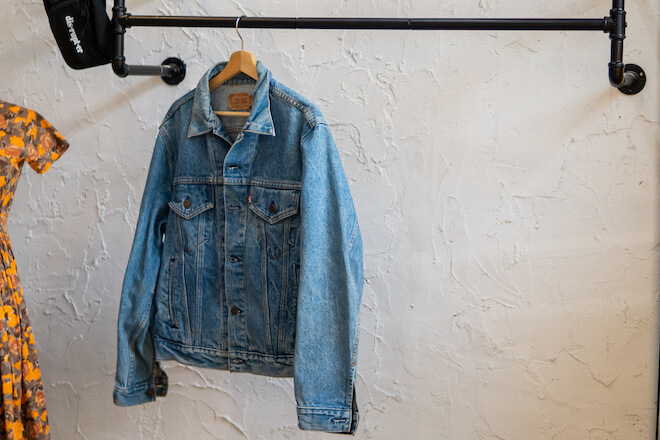
The brand is also expanding their home and hospitality line for homes, hotels and restaurant groups. This branch of the business started when the W Philadelphia asked McGlonn to create about 100 garments for their food and beverage teams.
McGlonn declined to publicly share revenue figures, but she said the business is growing. They plan to double their eight-person staff this year with the opening of the new location. To support their growth, she’s launching a fundraising round aimed at raising just over $3 million.
And for Grant Blvd, business growth means doubling down on the brand’s activism. The business became a B Corp last year. They also donated 1,303 books to the nonprofit Books through Bars — and two percent of all sales to Philadelphia Youth Sentencing and Reentry in 2021. (2022 figures will be released in February when the brand’s latest Impact Report comes out).
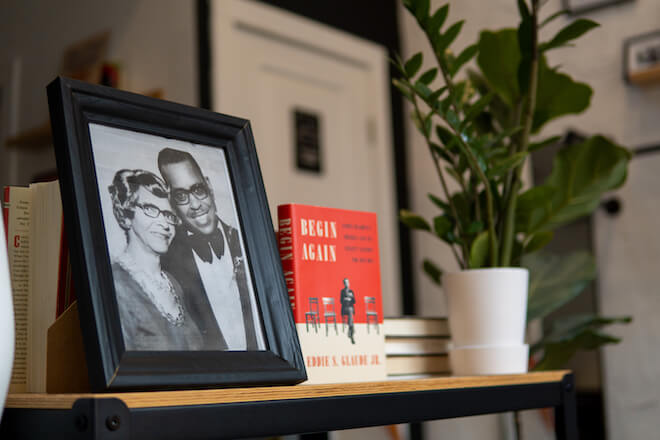
They remain a fair chance employer, doing pop-ups at Eastern State Penitentiary, and they pay all of their employees a living wage. McGlonn proudly sets the company’s wages using MIT’s Living Wage Calculator, which says Philadelphians should make at least $17.87 per hour. McGlonn still remains active politically as a Jenkintown councilwoman, though she’s since resigned from teaching high school English and instead holds a position as a faculty member at Drexel University’s Westphal College of Media Arts & Design.
Doubling down on her commitment to creating jobs, Grant Blvd is in the early stages of partnering with the Philly-based nonprofit Green Labor Lab to create an apprenticeship program for women experiencing homelessness or struggling to find employment due to a criminal record. The goal, McGlonn says, is to create a vehicle for living wage jobs.
She anticipated that the business will continue to grow as consumers become more aware of how detrimental fast fashion brands are to the environment.The ethical fashion market is expected to grow to $10.28 billion globally by 2026. Why shouldn’t Philly be at the helm of this movement? Local, environmentally conscious, slow fashion brands like Lobo Mau, United by Blue and, of course, Grant Blvd already exist in the city.
McGlonn says the highest ambition for her clothes is that they become a “visual business card, where you know that that look is from Grand Blvd.”
“And I know that if I see it in a room that that’s also a person that shares my values,” she says. “They care about people. They care about the planet. They care about shopping small. They care about supporting Black-owned businesses. They care about living wages.”
![]() MORE BUSINESSES FOR GOOD FROM THE CITIZEN
MORE BUSINESSES FOR GOOD FROM THE CITIZEN



